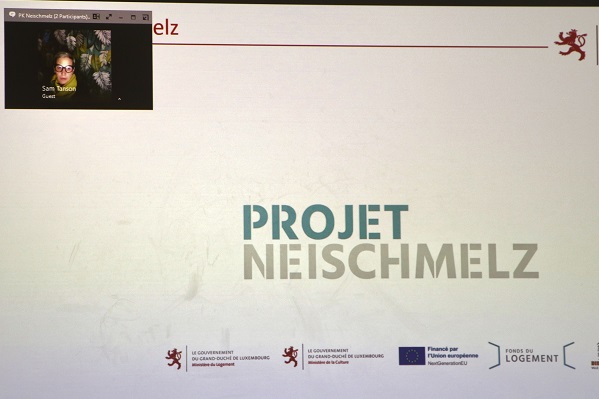 Credit: MLOG
Credit: MLOG
The Luxembourg government has just adopted two financing bills to support the first construction phase of the new “NeiSchmelz” residential district in Dudelange with €500 million.
Right in the centre of the town of Dudelange, on nearly 36 hectares, the old iron and steel wastelands will be converted into a modern and ecological town district. The vast majority of the 1,575 housing units will be for affordable rental. Developed by the Housing Fund (Fonds du Logement), the NeiSchmelz project will also be supported by a cultural component: the establishment of the national centre for public collections. Beyond a national repository for the storage of works, this new centre will be a place of work and exchange for the many professions linked to the conservation of movable heritage.
The 1,575 housing units will accommodate around 3,700 people within fifteen years. In order to offer a balanced mix between owners and tenants, the project provides for: 866 affordable rental units; 551 affordable subsidised housing units; 158 units for sale at moderate cost, not subsidised.
The residential part of NeiSchmelz represents at least 56% of all the gross surfaces (excluding parking spaces) projected. It is also planned to implement local shops, restaurants and bistros, workplaces, meeting points, as well as structures for leisure and entertainment.
The project will also integrate the principles of the circular economy and sustainable development. Therefore, it will apply new forms of construction that consume less land and meet general ecological criteria and the regional typology of built heritage. Particular emphasis is placed on the quality of life of residents, according to the Ministry of Culture and the Ministry of Housing.
The district aims for neutrality in terms of CO2 emissions. The production of electrical energy will be ensured by photovoltaics. The European Union (EU) is contributing €24 million to the energy concept of the NeiSchmelz project. This amount represents a quarter of the aid allocated to Luxembourg under the Recovery and Resilience Facility.
According to the latest planning from the Housing Fund, this project will take at least fifteen years before being finalised. As with most larger-scale housing projects, the fund has planned successive implementation in several phases in order to allow the integration of the new district into the existing urban fabric of the town of Dudelange.
Regarding the national public collections centre, Luxembourg's Minister of Culture Sam Tanson stated: "It is essential to guarantee the transmission of the national movable cultural heritage in optimal conditions for future generations". The mission of the new centre will be to manage this conservation, set up optimal working conditions for curators, researchers and restorers, as well as to create a place for the exchange of knowledge related to cultural heritage and its preservation. The project also includes exhibition spaces.
The Housing Fund will eventually carry out the cleaning up of industrial pollution, the preservation and rehabilitation of the architectural heritage, the revalorisation of the natural heritage through the "Diddelénger Baach", the carrying out of servicing works as well as the construction of housing as part of special development plans.
The total financial participation of the Luxembourg state was estimated at €507.5 million initially broken down as follows:
- A bill authorising the state to participate in the financing of the remediation and upgrading of the site of the NeiSchmelz project. The budget of €235 million for this bill consists of soil remediation costs, the redevelopment of the “Diddelénger Baach” watercourse and the construction of specific infrastructures specific to the NeiSchmelz site. The costs covered by this bill are borne entirely by the state;
- A bill authorising the state to participate in the financing of the housing development of the NeiSchmelz project. The budget of €272.5 million for this bill consists of the costs of servicing and building housing for special development plans. The costs covered are subsidised by the Ministry of Housing.
Finally, a third financing bill will be implemented over the coming years for the construction of housing for the “South” special development plan, as well as for the national centre for public collections, including an exhibition space, a works restoration workshop and laboratories.
Luxembourg's Minister of Housing, Henri Kox, commented: “The upgrading of the old Dudelange iron and steel site is the best illustration of this government's public, affordable and sustainable housing offensive. Particular emphasis is placed on functional and social diversity, the circular economy and the energy concept offering future inhabitants a high quality of life. With the four funding bills from Elmen, Wunne mat der Wooltz, Wëltgebond and now NeiSchmelz, almost €1 billion will be committed in one year for affordable housing. We are building for the right to housing in order to give a perspective for access to housing to those who need it most!".








